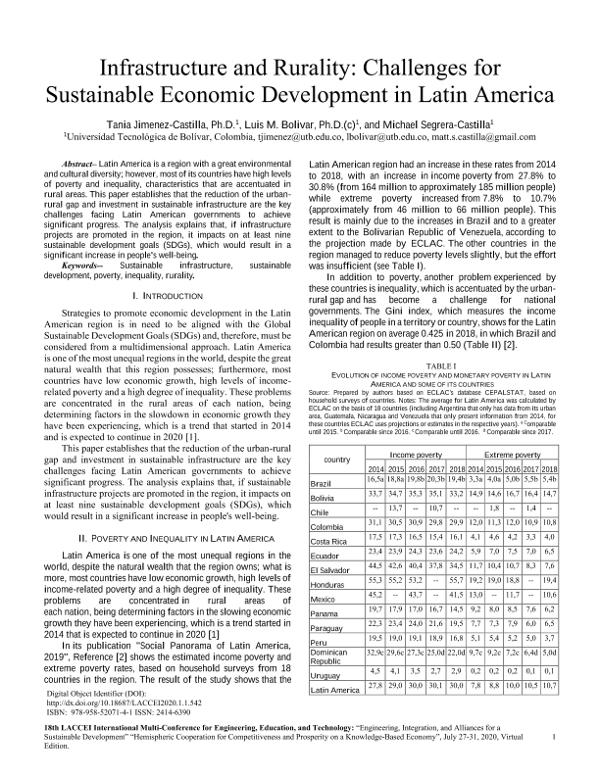Mostrar el registro sencillo del ítem
Infrastructure and rurality: Challenges for sustainable economic development in Latin America
| dc.contributor.author | Jimenez-Castilla, Tania | |
| dc.contributor.author | Bolívar Caro, Luis Miguel | |
| dc.contributor.author | Segrera-Castilla, Michael | |
| dc.date.accessioned | 2021-02-11T20:00:24Z | |
| dc.date.available | 2021-02-11T20:00:24Z | |
| dc.date.issued | 2020 | |
| dc.date.submitted | 2021-02-10 | |
| dc.identifier.citation | Tania Jimenez-Castilla, Ph.D., Luis M. Bolivar, Ph.D.,, and Michael Segrera-Castilla, "Infrastructure and Rurality: Challenges for Sustainable Economic Development in Latin America", 18th LACCEI International Multi-Conference for Engineering, Education, and Technology, 2020, pp. 1-8, http://dx.doi.org/10.18687/LACCEI2020.1.1.542. | spa |
| dc.identifier.uri | https://hdl.handle.net/20.500.12585/9988 | |
| dc.description.abstract | Latin America is a region with a great environmental and cultural diversity; however, most of its countries have high levels of poverty and inequality, characteristics that are accentuated in rural areas. This paper establishes that the reduction of the urban-rural gap and investment in sustainable infrastructure are the key challenges facing Latin American governments to achieve significant progress. The analysis explains that, if infrastructure projects are promoted in the region, it impacts on at least nine sustainable development goals (SDGs), which would result in a significant increase in people's well-being. | spa |
| dc.format.extent | 8 páginas | |
| dc.format.mimetype | application/pdf | spa |
| dc.language.iso | eng | spa |
| dc.rights.uri | http://creativecommons.org/licenses/by-nc-nd/4.0/ | * |
| dc.source | Engineering, Integration, and Alliances for a Sustainable Development. Hemispheric Cooperation for Competitiveness and Prosperity on a Knowledge-Based Economy: Proceedings of the 18th LACCEI International Multi-Conference for Engineering, Education and Technology | spa |
| dc.title | Infrastructure and rurality: Challenges for sustainable economic development in Latin America | spa |
| dcterms.bibliographicCitation | ECLAC, “The general slowdown persists in Latin America and the Caribbean in 2019 and low growth is expected by 2020 <Persiste la desaceleración generalizada en América Latina y el Caribe en 2019 y se espera un bajo crecimiento para 2020>,” Economic Commission for Latin America and the Caribbean, 2019. [Online]. Available: https://www.cepal.org/es/comunicados/persiste-ladesaceleracion-generalizada-america-latina-caribe2019-se-espera-un. [Accessed: 14-Apr-2019]. | spa |
| dcterms.bibliographicCitation | ECLAC, “Social Panorama of Latin America, 2019,” Santiago, 2019. | spa |
| dcterms.bibliographicCitation | ECLAC, “Statistical Yearbook of Latin America and the Caribbean, 2018,” Santiago, 2019. | spa |
| dcterms.bibliographicCitation | T. I. Jimenez, “Renewable energies and community tourism: a joint commitment to the sustainable human development of rural communities,” Rev. Energética, vol. 44, pp. 93–105, 2014. | spa |
| dcterms.bibliographicCitation | R. Sanchez, L. Jeannette, and P. Chauvet, “Infrastructure investments in Latin America: Trends, gaps and opportunities.,” Santiago, 2017. | spa |
| dcterms.bibliographicCitation | T. I. Jimenez, L. M. Bolivar, and M. Segrera, “Sustainable Development in Colombia: Challenges for Compliance with the 2030 Agenda,” in Economic Policies for Development: Beyond the Millennium Goals, Madrid, 2020, p. Chapter 12. | spa |
| dcterms.bibliographicCitation | UNDP, “Multidimensional progress: wellbeing beyond income. Regional Report on Human Development for Latin America and the Caribbean.,” Santiago, 2016. | spa |
| dcterms.bibliographicCitation | A. Novaes, R. Mendes, and M. Hallack, “Light for rural education: more energy to reduce school dropout <Luz para la educación rural: más energía para reducir el abandono escolar>,” Interamerican Development Bank, 2019. [Online]. Available: https://blogs.iadb.org/energia/es/una-luz-para-laeducacion-rural-mas-energia/. [Accessed: 14-Apr2019]. | spa |
| dcterms.bibliographicCitation | S. I. Campos, “Full of water, but thirsty: the future of water in Latin America and the Caribbean ‘Llenos de agua, pero con sed: el futuro del agua en América Latina y el Caribe,’” Interamerican Development Bank, 2019. [Online]. Available: https://blogs.iadb.org/agua/es/3504/. [Accessed: 14- Apr-2019]. | spa |
| datacite.rights | http://purl.org/coar/access_right/c_abf2 | spa |
| oaire.version | http://purl.org/coar/version/c_970fb48d4fbd8a85 | spa |
| dc.identifier.url | http://laccei.org/LACCEI2020-VirtualEdition/meta/FP542.html | |
| dc.type.driver | info:eu-repo/semantics/lecture | spa |
| dc.type.hasversion | info:eu-repo/semantics/publishedVersion | spa |
| dc.identifier.doi | 10.18687/LACCEI2020.1.1.542 | |
| dc.subject.keywords | Sustainable infrastructure | spa |
| dc.subject.keywords | Sustainable development | spa |
| dc.subject.keywords | Poverty | spa |
| dc.subject.keywords | Inequality | spa |
| dc.subject.keywords | Rurality | spa |
| dc.rights.accessrights | info:eu-repo/semantics/openAccess | spa |
| dc.rights.cc | Attribution-NonCommercial-NoDerivatives 4.0 Internacional | * |
| dc.identifier.instname | Universidad Tecnológica de Bolívar | spa |
| dc.identifier.reponame | Repositorio Universidad Tecnológica de Bolívar | spa |
| dc.publisher.place | Cartagena de Indias | spa |
| dc.subject.armarc | LEMB | |
| dc.type.spa | http://purl.org/coar/resource_type/c_8544 | spa |
| dc.audience | Público general | spa |
| oaire.resourcetype | http://purl.org/coar/resource_type/c_c94f | spa |
Ficheros en el ítem
Este ítem aparece en la(s) siguiente(s) colección(ones)
-
Productos de investigación [1453]
Universidad Tecnológica de Bolívar - 2017 Institución de Educación Superior sujeta a inspección y vigilancia por el Ministerio de Educación Nacional. Resolución No 961 del 26 de octubre de 1970 a través de la cual la Gobernación de Bolívar otorga la Personería Jurídica a la Universidad Tecnológica de Bolívar.













